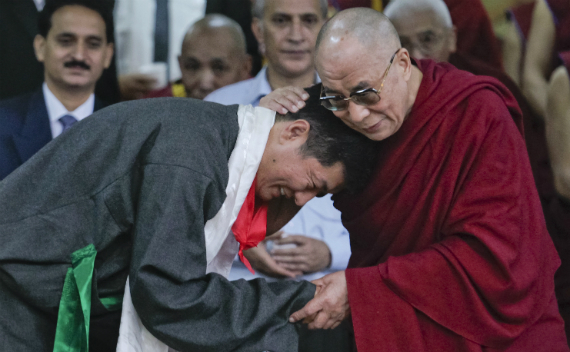Who Will Meet with the Tibetan Prime Minister?
More on:

The new prime minister of Tibet’s government in exile is in Washington this week, and which senior officials of the United States government will meet with him? None.
The new prime minister, Lobsang Sangay, will have numerous visits to Capitol Hill to see members of the House and Senate. No one from the State Department or the White House or NSC staff is, it appears, willing to see him. This is part of the Obama administration pattern, and Foreign Policy noted “the perception that the Obama administration has mistreated the Tibetan government-in-exile -- for example, by downgrading the location and publicity of Obama’s meetings with the Dalai Lama and, in one case in Feb. 2010, making the Dalai Lama leave through a back door of the White House and walk past garbage in order to avoid the press.”
But this story of refusing to meet with Tibetan officials is a great deal older than the Obama administration. When I was assistant secretary of state for human rights in the Reagan Administration, no official of the “Office of Tibet” in Washington was permitted to enter the State Department building. When I finally got permission to meet with the Tibetans (against the strenuous objections of the Department’s China desk), I was told to do it elsewhere—and spoke with them in the lobby of a hotel.
The reasoning was the same: let’s not make the Chinese angry. And it was faulty then and it is faulty now. There has been a sharp deterioration of the human rights situation in Tibet this year; ten monks have set themselves on fire to bring attention to the conditions there in only the past month. Human Rights Watch reports “drastic restrictions on Tibetan monasteries” including “brutal security raids, arbitrary detentions of monks, increased surveillance within monasteries, and a permanent police presence inside monasteries to monitor religious activities.” Freedom House calls Tibet one of the “worst of the worst” places on Earth.
So the policy of appeasing China has produced only more repression. A policy of drawing attention to the brutal Chinese repression has a far better chance of affecting Chinese behavior. That, at least, is the conclusion one must draw from the recent pattern: as the United States under the Obama administration has treated the Dalai Lama worse, Chinese treatment of the Tibetan people has become worse. It is impossible to prove that if the Dalai Lama and Mr. Sangay were treated far better--if the Dalai Lama were escorted in and out the front door as was done in the George W. Bush administration, if Mr. Sangay were received by senior officials who used the occasion to lambaste Chinese repression—Chinese abuses would diminish. But it is an experiment well worth trying, one the Tibetans wish us to try, and one that would associate our country with the cause of human rights. Those are persuasive arguments.
More on:
 Online Store
Online Store